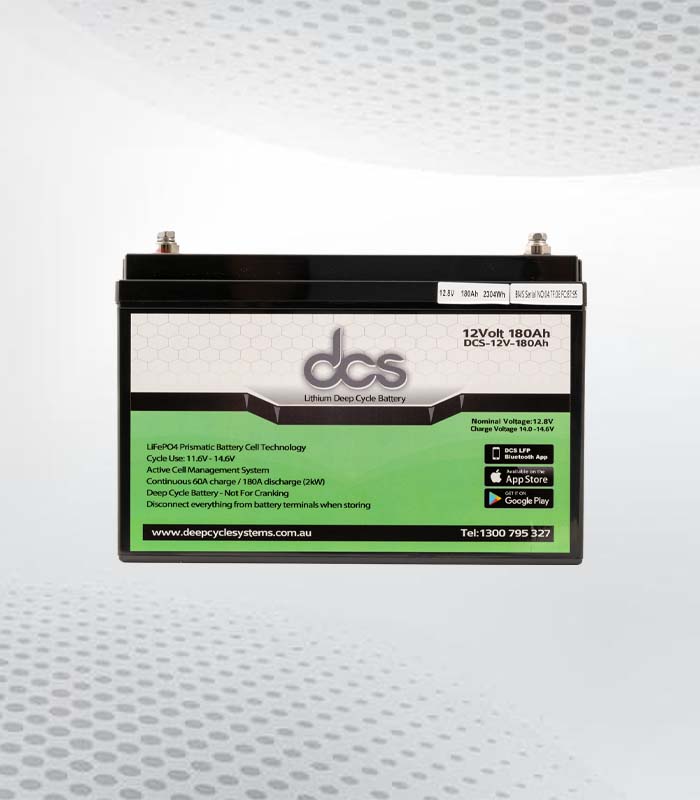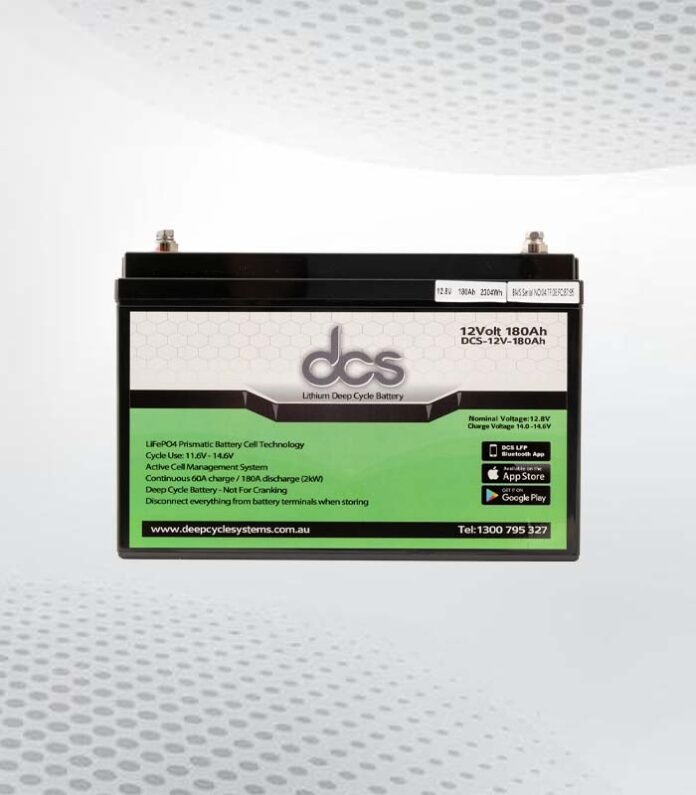Solar energy has become a popular and sustainable alternative to traditional sources of electricity. As more people turn to solar panels to power their homes and businesses, it is important to understand the role of key components in these systems. One crucial element is the battery, specifically the 180Ah battery. This powerful and efficient battery plays a vital role in storing and supplying energy from solar panels. This blog post will explore the importance of the 180-ah battery in solar panels and how upgrading to this battery can enhance your energy usage.
Understanding The Basics: What Is A 180-Ah Battery?
To understand the importance of a 180-ah battery in a solar panel setup, it’s first important to grasp what it exactly is. The term ‘Ah’ is an abbreviation for Ampere Hours, a unit used to express the electrical storage capacity of batteries. Therefore, a 180-ah battery indicates it can deliver a current of 180 amps for a duration of one hour.
Alternatively, it could also supply one amp for a lengthy 180 hours. This shows the impressive storage potential of the battery. These batteries are often found in autonomous solar panel systems which require a substantial amount of energy storage. Their durability and longevity make them ideal for ensuring uninterrupted power supply, even during times of minimal sunlight.
The Powerhouse: Role of A 180-Ah Battery in Solar Panels
In the comprehensive layout of a solar panel system, the 180-ah battery assumes an indisputable principal role as the main repository for the amassed electrical power. The inexhaustible resource of sunlight is deftly seized during the sunlit hours of the day by the efficient solar panels.
The trapped energy from the sun is subsequently directed into the waiting storage of the 180-ah battery. However, inevitable moments arise – for instance, in the enveloping darkness of night or during heavy cloud cover – when the panels are incapable of generating power. During these power-less intervals, the battery fulfils its significant role. It confidently dips into its reserves of accumulated power to provide the needed electrical current, thereby assuring the solar panel system maintains operational functionality.
This seamless provision of power reinforces the pivotal role that a robust 180-ah battery plays within a solar power arrangement. A resilient, dependable 180-ah battery significantly contributes towards a more viable and reliable energy resolution, unhampered by weather fluctuations or varying daylight hours.
Distinguishing the Difference: 180-Ah Battery Vs 180 Amp Battery
You may have noticed the terms 180-ah battery and 180 Amp battery used interchangeably. However, they are not the same and refer to different aspects of a battery’s performance. The ‘Ah’ in 180Ah stands for Ampere Hours, a unit of electric charge. It essentially signifies the total amount of charge a battery can store. Hence, a 180-ah battery can deliver a current of 180 amps for one hour or one amp for 180 hours. This is its capacity or how much electricity it can hold.
On the other hand, a ‘180-Amp battery’ refers to the maximum discharge rate of the battery, which is the maximum amount of current it can provide at a given moment. It shows the battery’s power delivery capabilities rather than its energy storage potential. In simpler terms, if a battery’s Ah rating is its ‘fuel tank size’, the Amp rating could be likened to the speed at which it can drain that tank.
Both these ratings are significant and must be considered when selecting a battery for your solar panel system, as they impact its performance and longevity. In the next section, we will discuss how to optimise the use of your 180-ah battery to ensure its efficiency and durability.
Maximising Efficiency: How to Make the Most of Your 180-Ah Battery
Proper maintenance is key to optimising the performance of your 180-ah battery. Regular cleaning helps to prevent dust and debris accumulation which could impede the battery’s function. It’s also important to ensure correct charging practices are in place.
Overcharging or undercharging can lead to a shorter lifespan and compromised efficiency. In particular, strive to keep your battery at a state of charge (SOC) of about 50-80% to enhance its durability.
 Also, be mindful of the environmental conditions in which your battery operates. Extreme heat or cold can impact its performance and lifespan negatively. Regularly monitoring your battery’s voltage, temperature, and overall health can also be useful.
Also, be mindful of the environmental conditions in which your battery operates. Extreme heat or cold can impact its performance and lifespan negatively. Regularly monitoring your battery’s voltage, temperature, and overall health can also be useful.
Lastly, try to avoid completely depleting your battery, a practice known as ‘deep discharge’, which can significantly curtail the lifespan of your battery. By following these recommendations, you can ensure the longevity of your 180-ah battery, ultimately resulting in a more effective and robust solar power system.
Choosing the Right One: How to Pick the Right 180ah Battery Solar Panel
Selecting the most suitable 180ah battery solar panel setup can seem daunting, yet it’s a vital decision that will influence your system’s efficacy and durability. Firstly, identify your daily energy usage demands. If you live in a region with frequent sunlight, a single 180-ah battery might suffice. However, those in less sunny areas might require more than one to guarantee consistent power.
Budget also plays a crucial role, and while it’s prudent to seek a cost-effective solution, don’t compromise on quality. Examine the specifications of your solar system. Is it compatible with the battery you are considering? Will it be able to handle the power load? The answers to these questions can guide you towards an appropriate choice.
When it comes to brands, it’s advisable to stick to ones that have proven their dependability over time. Look out for batteries with extensive lifespans and solid warranty periods, which will safeguard your investment. Remember that cheaper alternatives might end up costing more in the long run if they break down prematurely. Lastly, reviews from existing users can provide invaluable insights into a battery’s performance and reliability, helping you make an informed decision.
The Future Is Bright: The Future of Solar Power and 180Ah Batteries
As we steer towards cleaner, more sustainable energy alternatives, the scope for solar power and the pivotal 180Ah batteries is positively promising. With solar power now being widely embraced by individuals, businesses and governments alike, the necessity for reliable and robust storage solutions like the 180-ah battery is set to surge.
Advances in technology are simultaneously driving the evolution of solar panels and batteries. Solar panels are becoming increasingly efficient at harnessing sunlight, thereby escalating the demand for high-capacity batteries that can effectively store this generated power.
This shift is further encouraging the development of batteries with enhanced capacities and extended lifespans, leading to more reliable and long-lasting energy solutions. A case in point is the 180-ah battery, which is continually being refined to accommodate larger amounts of energy while ensuring longevity.
Moreover, the cost of these batteries is projected to drop with increased production and economies of scale. This, coupled with the increasing energy efficiency of solar panels, means that solar energy solutions, backed by 180Ah batteries, are becoming a more accessible and economical choice for an expanding demographic. The scenario paints a future where the potential of solar power, supported by 180Ah batteries, shines brighter than ever.
Busting Myths: Misconceptions about 180ah Batteries
Several unfounded beliefs circulate about 180Ah batteries, which often deter potential users.
- One of the prevailing misconceptions is that these batteries demand high maintenance. Contrary to this belief, contemporary 180Ah batteries are designed with user-friendly features that require minimal upkeep. Regular checks on voltage, temperature, and cleaning are all that is typically needed to keep them running optimally.
- Another common myth is that 180Ah batteries are exorbitantly priced. Whilst the initial investment might seem high, it’s crucial to consider the long-term benefits. These batteries offer a substantial lifespan and operational efficiency, rendering them a cost-effective solution over time.
- Safety concerns also loom large, with some assuming that these batteries are unsafe. In actuality, modern 180Ah batteries are engineered with a host of safety measures to prevent short circuits, overcharging, and other potential hazards.
By dispelling these myths and gaining a comprehensive understanding of 180Ah batteries, users can make informed decisions and optimise their use of solar energy.
Impact of Temperature on the Performance of 180-Ah Batteries in Solar Panel Setups
Temperature can significantly affect the performance of a 180-ah battery in a solar panel setup. Batteries generally perform best in moderate temperatures, usually around 25°C. However, when the temperatures veer to extremes, either too hot or too cold, it can adversely affect the battery’s efficiency and lifespan.
During scorching conditions, batteries can overheat, leading to quicker degradation of their components and reducing their life expectancy. On the other hand, in freezing temperatures, the chemical reactions within the battery slow down. This reduces the battery’s capacity, resulting in less power output.
Additionally, extreme temperatures can increase the self-discharge rate of the batteries, thus decreasing the total amount of stored energy available for use. Hence, maintaining a stable and suitable temperature is critical for the optimum operation and longevity of your 180-ah battery. It’s therefore important to consider the installation location of your solar setup.
Try to install your batteries in a temperature-controlled environment or provide adequate insulation to protect them from temperature fluctuations. Various battery technologies also come with different temperature tolerances, so it’s worth researching the most suitable one for your specific environmental conditions.
FAQs
1. How long does an 180Ah battery last?
The lifespan of an 180Ah battery largely depends on its usage, maintenance, and environmental conditions. With proper care, it can last several years. Avoid practices like deep discharge and overcharging to extend its lifespan.
2. Can an 180Ah battery power my home?
The capability of an 180Ah battery to power a home depends on the home’s energy consumption and the number of sunlight hours the location receives. A single battery might suffice for minimal usage, but for larger energy demands, multiple batteries might be needed.
3. is an 180Ah battery safe?
Modern 180Ah batteries are engineered with safety measures to prevent potential hazards like short circuits and overcharging, making them safe for use. However, it’s important to follow the manufacturer’s safety guidelines for optimal use.
4. Is an 180Ah battery expensive?
While the initial cost of an 180Ah battery can seem high, it’s worth considering its long-term benefits. These batteries are cost-effective in the long run, thanks to their durability and efficient performance.
5. What are the maintenance requirements for an 180Ah battery?
Maintenance for an 180Ah battery typically includes regular checks on voltage and temperature and cleaning to prevent dust accumulation. Following proper charging practices and avoiding extreme environmental conditions can also help optimise its performance.
Conclusion
The integral role of an 180Ah battery in the realm of solar power cannot be overstated. Being the backbone of energy storage in solar panel systems, the selection of an appropriate battery is key in optimising the overall performance of your solar setup. The rise in popularity of renewable energy solutions only accentuates the significance of these powerful batteries. By grasping their function and potential, you can effectively capitalise on solar energy, helping to cultivate a more sustainable future.
This Article Was First On Published
| Other Good Articles to Read |
| Cme Blog Spot |
| Garcias Blogs |
| Yyc Blogs |
| Guiade Blogs |
| Blogs-Hunt |
| Impact-Blog |
| Smarty Blogs |
| Ed Blog |
| Mo Blogs |
| Blogs Em |
| Blog St |
| Related Business Listings |
| Directory Submissions |
| Regional Directory |


